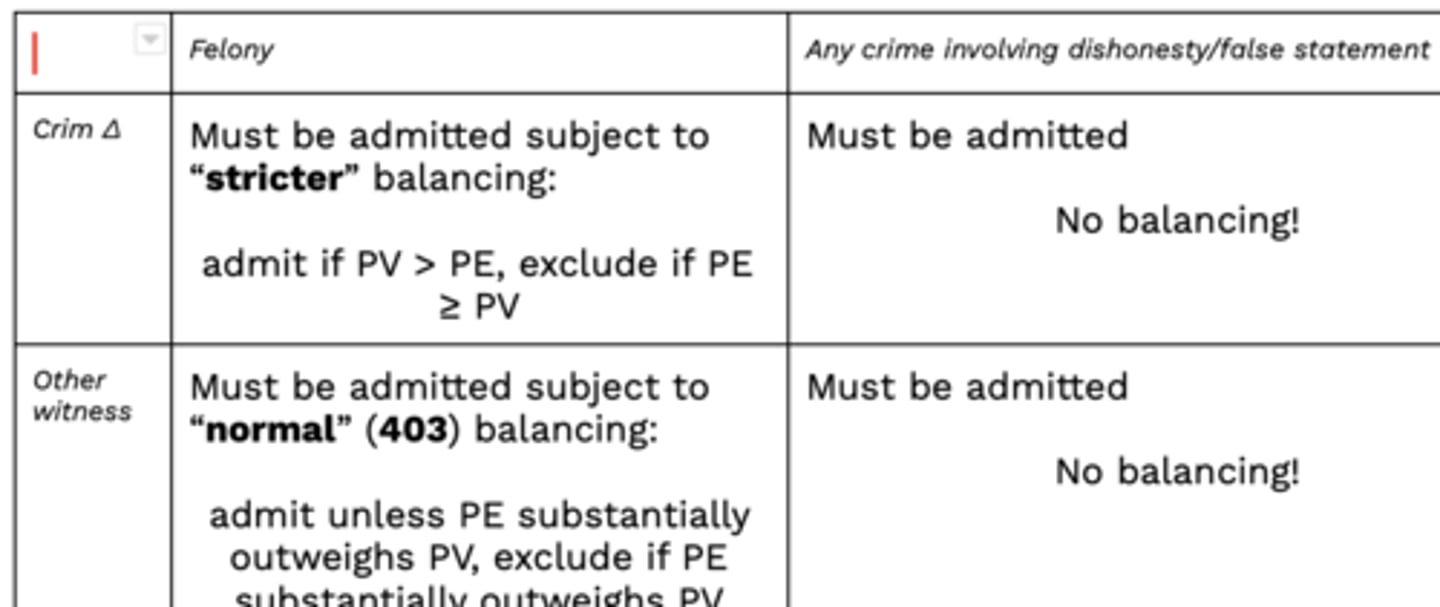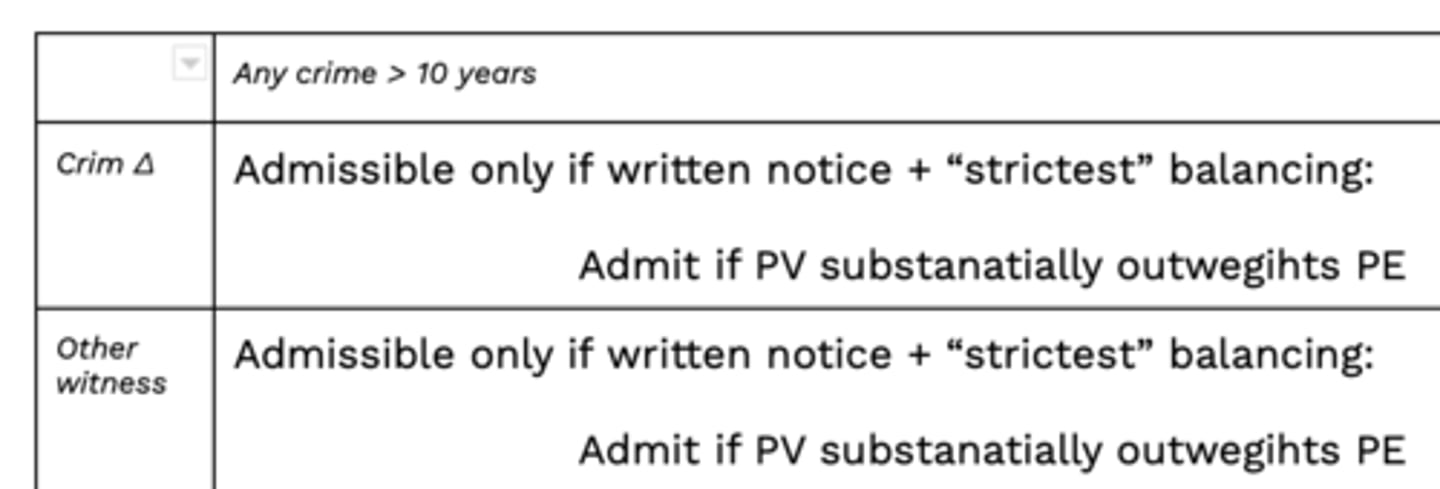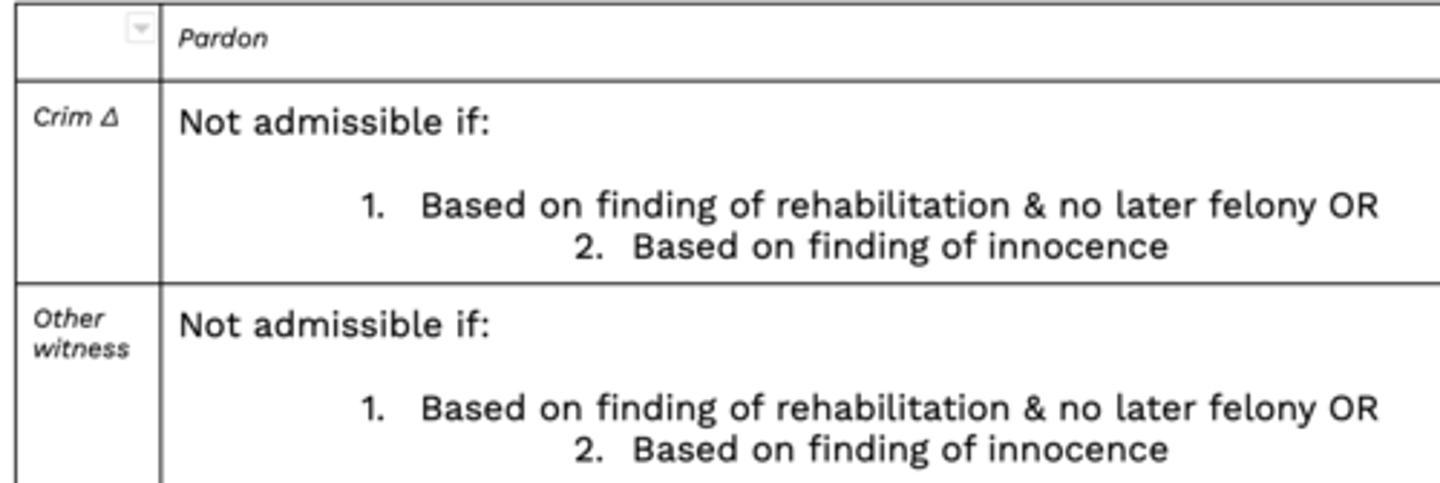Strong Evidence
1/57
There's no tags or description
Looks like no tags are added yet.
Name | Mastery | Learn | Test | Matching | Spaced |
|---|
No study sessions yet.
58 Terms
admitting evidence
Admitting evidence:
1. Mark for identification with clerk/reporter
2. Show (to other counsel, so they can object down the line)
3. Identify (separate from authenticating—need to show what the object even is via witness)
4. Complete foundation based on type of evidence (i.e., real or demonstrative)
5. Admit
6. Publish (get it to the jury)
(admitting evidence) complete foundation
Real
- Authentic (901) → in most circumstances, don’t need chain of custody if item has been made distinctive
- Unchanged → condition not materially different; for fungible goods, need chain of custody → continuous, secure possession; could be shown by evidence bag w/ tamper-evident seal
Demonstrative → fair & accurate representation as of the relevant time
- If unable to admit evidence as real, could probably admit on demonstrative basis (& likely wouldn’t have effect on jury)
402
general admissibility of relevant evidence
relevant unless Constitution, fed statute, fed rules of evidence, or other rules prescribed by SCOTUS
401
test for relevant evidence
Logical relevance → tendency to make fact more/less likely; very low threshold b/c any other standard would be unworkable
Materiality → fact of consequence in determining action
logical relevance (401)
tendency to make fact more/less likely
very low threshold b/c any other standard would be unworkable
materiality (401)
fact of consequence in determining action
403
balancing inquiry for excluding relevant evidence (prejudicial effect)
Probative value substantially outweighed by unfair prejudice, confusing the issues, misleading the jury, undue delay, wasting time, needlessly presenting cumulative evidence
404
whether or not you can admit character evidence
Exceptions to character evidence bar in criminal cases (404(a)) for evidence of:
- A pertinent character trait
- Of the defendant or an alleged victim
- Offered by the defendant
- Or by the prosecution ONLY IF the defendant opened the door
405
how you can admit character evidence
- Reputation/opinion
- Specific instances of conduct when character essential element of charge, claim, or defense
404(b)(2)
[evidence of person’s character not admissible to prove person acted in accordance w/ character] except to show motive, opportunity, intent, preparation, plan, knowledge, identity, absence of mistake, lack of accident
802
hearsay inadmissible unless exception in fed statute, FRE, SCOTUS rules
hearsay concerns
ambiguity, sincerity, memory, faulty perception
hearsay definition (from 801)
statement that:
- Declarant doesn’t make at current trial/hearing
- That party offers in evidence to prove truth of matter asserted in statement
803(1)
present sense impression
- Describes/explains event/condition
- Made while perceiving event/condition
- Or immediately thereafter
803(2)
excited utterance
- Relates to startling event/condition
- Made under stress of excitement
- Caused by startling event/condition
801(d)(2)
admissions by a party opponent
statement not hearsay if statement of opposing party + offered against that party
- Personal statement
- Adoptive admission
- Authorized statement → made by person whom party authorized to make statement on that subject
- Agent/employee's statement → made by party’s agent/employee on matter within scope of employment relationship while relationship still ongoing
- Co-conspirator’s statement → made during + in furtherance of conspiracy
805
“nested hearsay”
statement not excluded when each part within part conforms to an exception/exclusion
105
limiting evidence admissible for one purpose but not another
804(b)(1)
former testimony
- Former testimony at trial, hearing, or deposition
- By an unavailable declarant, and
- Opportunity & similar motive to develop former testimony
- By the party against whom it’s now offered
-In civil case, by predecessor in interest
804(a)
requirements for unavailability
- Privilege (if court rules it applies)
- Refusal despite court order
- Memory failure (declarant must testify to not remembering)
- Illness/death
- Absence despite reasonable effort (i.e., subpoena)
- Wrongfully-caused unavailability
804(b)(3)
statements against interest
a statement:
- By unavailable declarant
- So contrary to declarant’s interest when made that
- A reasonable person would’ve made it only if they believed it to be true
- Interest must be:
- Pecuniary → financial
- Proprietary → property
- Interest re: civil liability, or
- Penal → potential for criminal liability
- To use statement against penal interest in criminal case, corroborating circumstances must clearly indicate statement’s trustworthiness
803(3)
then-existing state of mind
statement of:
- The declarant’s then-existing:
- State of mind
- Emotional condition
- Sensory condition, or
- Physical condition
- Not including a statement of memory/belief to prove the fact remembered/believed
- Unless it relates to the validity of terms of declarant’s last will & testament
803(4)
medical exceptions
statement:
- Made for medical diagnosis/treatment, and
- Reasonably pertinent to diagnosis/treatment,
- Describing:
- Medical history
- Past/present symptoms/sensations
- Their inception
- Or their general cause
804(b)(2)
dying declaration
a statement:
- Made by an unavailable declarant
- Made while believing death imminent
- About its cause/circumstances
- In homicide prosecution or civil case
801(d)(1)(C)
statements of prior identification
statement:
- Identifying a person
- As someone the declarant perceived earlier
- The declarant must testify
- And be subject to cross examination about prior statement
803(5)
past recollection recorded
a record:
- On matter witness once knew about
- But now can’t recall fully & accurately
- Made/adopted by witness
- When matter was fresh in witness’s emory
- And that accurately reflected witness’s knowledge
- May be read into evidence, but not received as an exhibit unless offered by adverse party
611
no leading testimony except as necessary to develop witness's testimony
612
writing used to refresh a witness
writing used to refresh a witness:
- Upon showing of failure of recollection
- Examining party may attempt to refresh by showing witness anything (subject to court’s discretion)
- Must show a revival of present recollection
- May not introduce item used without independent evidentiary basis to do so
- Opposing party may inspect, cross examine witness about it, & introduce any portion related to witness testimony
803(6)
business records
a record:
- Made at/near time of event
- By/from info transmitted by someone w/ knowledge
- Who was not an outsider to business activity, and
- Kept in course of regularly conducted business activity, if
- Making record was a regular practice of that activity, and
- The opponent doesn’t show a lack of trustworthiness
902
self-authenticating items of evidence (i.e., no extrinsic evidence of authenticity needed)
902(11)
certified domestic records of regularly conducted activity
- Custodian certifies
- Must provide opponent written notice
902(12)
foreign records
If falsely made, subjects maker to criminal penalty in county where record made
803(8)
public records
- A record of a public office setting out
- Activities of the office
- Matter observed while under a legal duty to report
- Except by LE personnel in crim cases
- Fact findings from legally-authorized investigation
- Except when off'd against accused in crim case
- No showing of untrustworthiness by the opponent
807
residual exception - intended to be used narrowly/very rarely
- Supported by sufficient guarantee of trustworthiness that is
- More probative on the point than any other reasonably available evidence, if
- Reasonable notice given in writing before trial/hearing
- Unless excused for good cause shown
Ohio v. Roberts
When hearsay declarant not present, the Confrontation Clause requires:
- Unavailability of declarant (normally), and
- Adequate indicia of reliability, satisfied by:
- Firmly rooted hearsay exception
- Particularized guarantees of trustworthiness
Crawford v. Washington
for testimonial hearsay, 6th amendment requires:
- Unavailability of declarant
- A prior opportunity for cross examination of the declarant
Michigan v. Bryant
narrowing down definition of testimonial
A statement is testimonial if:
- Primary purpose of an interrogation is
- To create a record for use at trial; that is,
- To create an “out-of-court substitute for trial testimony”
A statement is non-testimonial if:
- Primary purpose of an interrogation is
- A purpose other than creating a record for trial (including, but not limited to, responding to an ongoing emergency)
804(b)(6)
statement offered against a party that wrongfully caused declarant’s unavailability [forfeiture by wrongdoing]
impeachment methods
1. Showing bias on the part of the witness
2. Impeachment by prior inconsistent statement
3. Attack upon witness’s character for truthfulness
4. Impeachment by contradiction
5. Challenging the witness’s memory, perception, or interpretation
607
who may impeach
any party, including the party that called the witness, may attack the witness’s credibility
US v. Hogan
govt:
- Can’t call a witness for the primary purpose
- Of impeaching the witness
- With evidence that’s otherwise inadmissible
State v. Oswalt & US v. Copelin
rule rooted in 403 values
- You can’t use extrinsic evidence merely
- To impeach a witness by contradiction
- On a collateral matter
608(a)
impeachement of a witness w/ character evidence re: veracity using reputation or opinion
in the form of reputation & opinion:
- Can be used to impeach any witness, but
- Can’t be used to support a witness whose character for truthfulness has not been attacked
608(b)
impeachment of a witness w/ character evidence re: veracity using specific instances of conduct - prior bad acts (other than crim convictions)
in the form of specific instances of conduct:
- Can be asked about on cross-examination, but
- You are “stuck w/ the answer”
FRE 609
impeachment of a witness w/ character evidence re: veracity using prior criminal convictions
609(a)

609(b)

US v. Sanders
similar offenses for impeachment purposes [609] should be admitted sparingly, if at all
Factors courts use to decide whether to exclude prior conviction offered to impeach accused
1. Impeachment value of prior crime
2. Point in time of conviction & witness' subsequent history
3. Similarity btwn past crime & charged crime
4. Importance of ∆'s testimony
5. Centrality of credibility issue
609(c)

609(d)

613
witness's prior statement
When examining a witness about a prior statement:
1. You don’t have to show/disclose the contents to witness
2. But you must show/dislcose the contents to opp counself on request
Extrinsic evidence of a prior inconsistent statement used for impeachment is admissible only if:
1. Witness is given opp to explain/deny statement (at some point), AND
2. Adverse party is given opp to examine witness about statement,
3. OR if justice requires admission of extrinsic evidence
801(d)(1)(A & B)
witness’s prior statement is not HS if the declarant/witness:
- Testifies and
- Is subject to cross about the statement, AND
1. Statement is inconsistent & was given:
- Under penalty of perjury
- At a prior proceeding or deposition; OR
2. Statement is consistent & is offered:
- To rebut a charge of recent fabrication or recent improper influence or motive, OR
- To rehabilitate when the witness’s credibility has been otherwise attacked
1002-1004
best evidence rule
to prove content, you need original, duplicate, or excuse
1. To prove the content
2. Of a writing, recording, or photograph
3. You must (in general) produce the original
4. OR a duplicate (usually good enough)
- Useable unless:
- Genuine question raised about original’s authenticity OR
- Circumstances make it unfair to admit duplicate
UNLESS:
5. The original is unavailable not due to your bad faith OR
6. It’s not closely related to a controlling issue
Meyers v. US, US v. Diaz-Lopez
best evidence rule ≠ literal best available evidence, just that you should provide original (instead of duplicate) if available
701
lay opinion not admissible unless:
1. Rationally based upon perception,
2. Helpful, &
3. Not based upon specialized knowledge
expert testimony (702, 703, 705)
1. A qualified expert may testify
2. In the form of an opinion (or otherwise)
3. If the expert’s specialized knowledge will
4. Help the trier of fact
5. & the testimony is based upon sufficient data
6. Of a kind reasonably relied upon by experts in the field
7. & the product of reliable principles & methods
8. Reliably applied
9. w/o first testifying to underlying data
704
opinion on an ultimate issue
(a) Generally, opinion not automatically objectionable for embracing ultimate issue
(b) Exception: in crim case, expert witness can’t state opinion about CMS/condition constituting element of crime or a defense